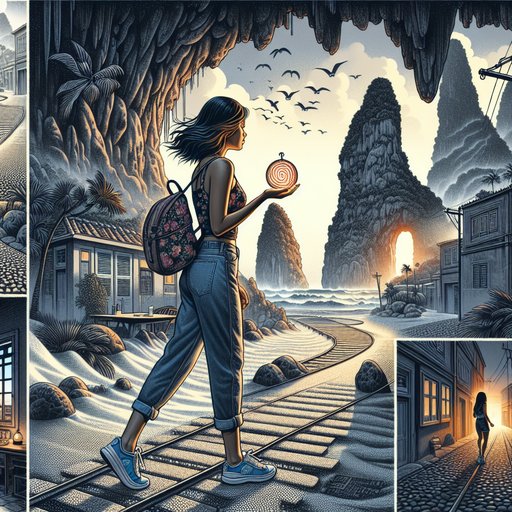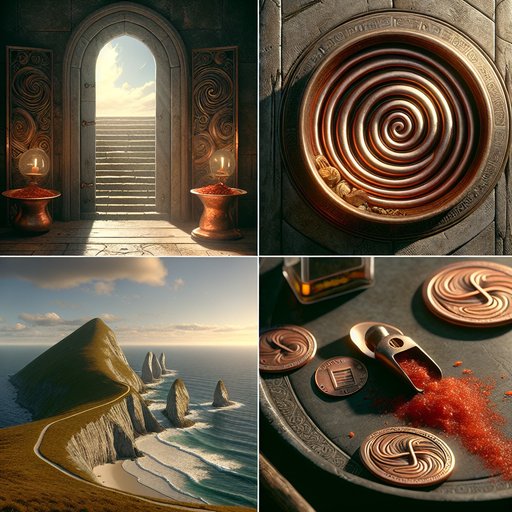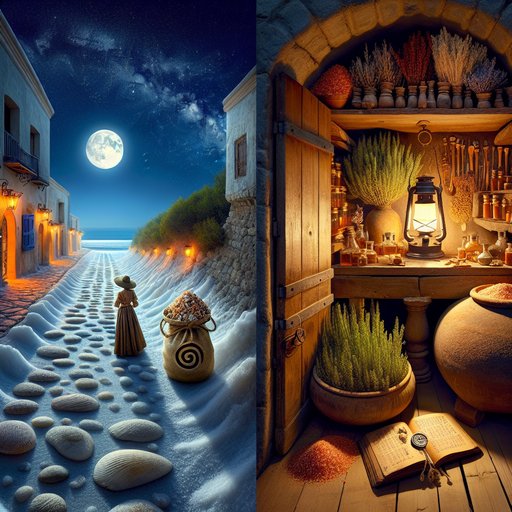CHAPTER 7 - Keeping the Salt Road's Secret

Barbra Dender, a 31-year-old red-haired traveler with freckles she dislikes and a quiet resilience forged by a childhood raised by her grandparents, arrives on Socotra seeking what most tourists never find. She rents a small room above a perfumer’s shop in Hadibo, where resin and citrus haunt the air, and her daily long walks carry her across wind-scoured plateaus. There, she notices strange alignments: stone cairns set like constellations, resin beading into script, and salt pans echoing maps. A ledger scrap stained with dragon’s blood resin hints at a “salt road” and a “singing cave,” pointing her toward Hoq Cave. Inside, Barbra finds a copper token crusted with salt, etched with a spiral and three bars. Locals turn away her questions; yet a resin spiral on her windowsill shows she’s being watched. She dresses up in glitter and Louboutins for a harbor music night, where an old song seems to whisper the token’s symbols back to her. Drawn into a wind-cut wadi, she discovers a narrow cleft that “sings,” its salt ridges aligned like the three bars. The token seems responsive to tones, suggesting the salt road is an acoustic map. A resin spiral with three small cuts appears on her window—an invitation—leading her to a hidden room of copper bowls and etched shells. She deciphers a path to a sea cave, only to find a staged cache: a decoy meant to test her. Frustrated but steady, she is finally approached by Amina, the perfumer’s wife, and a mute boy, Samir. Amina reveals the family’s guarded trust and teaches Barbra how brine and resin coax the token to sing. Guided by tone and moonlight, they trace the salt road to a concealed chamber of shell-etched ledgers, where rivals converge as the tide surges. Barbra escapes through a submerged exit with a resin-stained chest and surfaces in a grotto beside Salim, a harbor singer revealed as an ally. The chest conceals a palimpsest of codes safeguarding Socotra’s clandestine cistern network—water itself is the treasure. Pursued by smugglers led by Nabil, they misdirect the enemy and spirit away the true cipher hidden in etched shells. At dawn, the perfumer’s husband appears with Barbra’s token, smiling as if to test her once more, and asks her to choose a side. In the finale, Barbra commits to the keepers of the salt road and carries the living code up to the Dixam Plateau. There, amid dragon’s blood trees and wind, she helps integrate the code into the hidden network and deflects Nabil’s final approach with sound and smoke. The mystery remains protected, and the elders reward Barbra with a retired shell-key sealed in resin—a fitting relic for her glass cabinet. Relieved, she savors tea on the rooftop and the salt-scented breeze, knowing that some secrets are most beautiful when they remain unseen.
He held her copper token out on his palm as if offering a coin to the wind. Dawn on the rooftop made the resin jars glow, and the dragon’s blood trees on the horizon looked like upturned umbrellas catching orange light. “Choose,” the perfumer’s husband said, his voice a low scrape like clay on stone. He finally told her his name—Yusuf—as if the sharing of it carried weight.
Barbra, in her tight jeans, tank top, and blue-and-white Asics, freckled face bare and chilled in the sea breeze, studied the spiral and three bars and wondered how many people had been asked to choose before her. “You could make a map,” Yusuf said. “Others would come, thirsty for more than water.” Below them, Hadibo rustled awake, gulls sliding like scraps of white paper over the roofs. The token smelled faintly of brine and resin as she took it back, the metal warm from Yusuf’s skin.
“Or you can carry the living code where it needs to go,” he said, and Barbra heard in his tone what Amina had seen: the test wasn’t about cleverness but about care. She nodded, feeling both the old solitude of childhood and the strange thrill of being included. Trust had opened doors across this island, and she didn’t want to slam them with a careless choice. Amina stepped onto the roof with a scarf over her hair, Samir at her side, hands busy in the air with a silent language Barbra was learning to read.
Salim emerged behind them, the wind making his shirt ripple like a flag; there was a tiredness to his smile that made the harbor songs feel like secret work. “Dixam,” he said, tapping the shell-key he’d given her, its spiral etched with fine lines that shimmered when turned to the light. Barbra pulled on a black leather jacket against the plateau chill, the old one with scuffs like a map of other travels. They moved quickly, past the perfumer’s shop where citrus and resin mingled, out beyond the last blue doors of Hadibo, into emptiness.
The path rose, turning to gravel, then to pale limestone that reflected the morning like a mirror. Dragon’s blood trees lifted their scarlet scars to the instant sky, and the wind smelled clean, salted, and ripe with sap. Her legs felt steady and lithe from years of walking alone toward places most people only pointed at on maps. At the first ridge, Salim crouched and set down a copper bowl from the hidden room, its lip nicked as if life had chewed it a little.
Amina mixed brine and a smear of resin on her palm, and Samir touched three quick drops to the bowl’s rim—one, two, three—like a drummer without sticks. Barbra held her token over the bowl and hummed the tone she had learned, a note she could feel in the hollow of her chest. The bowl answered, the sound rolling out of the wadi and back as if a whale swam under the rocks. The echo slid left, pulling them toward a fold in the plateau where a low wall of stones crouched in the scrub.
“You hear it,” Amina whispered, her eyes on Barbra rather than on the land. Barbra smiled despite herself, despite the freckles she always felt too aware of in sunlight, and let the echo lead. The salt road was not a line you drew but a sequence you listened for, a song taught from rock to rock and kept by families that remembered how to hum and when to be silent. They moved in pieces: Salim ahead where the path could be seen, Amina and Samir measuring with brine and shell, Yusuf hanging back to watch the trail behind.
When a vulture circled low, Yusuf murmured, “Someone watches,” and Barbra felt her heart do a small, sober turn. Nabil’s men appeared as shadows first and then shapes—loose shirts, a flash of a blade hilt, the deliberate way people move when trying to seem casual. Salim lifted two fingers briefly, a signal Barbra didn’t know but Amina did; they narrowed into a gulley where the wind had polished the stone to a soft sheen. “If we sing here, we can be heard there,” Amina said, pointing to the opposite slope.
Barbra nodded, breath even, hand steady around the token that had begun to feel like a second pulse. The wind ran a cold fingernail up her arm like a promise. They let the copper bowl ring, and Barbra tilted the token until it sang back, a thinner note twining the deeper tone. The echo shot down the gulley and came back from the far slope, convincing anyone beyond that they had moved in the direction they had not.
Samir, nimble as smoke, scattered resin scraps that clung to stone like red confetti, a breadcrumb trail pointing the wrong way. Yusuf raised his jacket as if to make a screen, and they slipped along the gulley’s darker seam, steps muffled on the salt powder. When Nabil’s voice floated from the distance, laughing, it came from the place they had just vacated. By midday they reached the lip of a sinkhole half-hidden by thorn scrub, the stone worn smooth by centuries of hands.
A circle of shell shards sat around a fissure no wider than a pair of shoulders, each piece etched with spirals rubbed shiny by touch. Amina breathed on the shell-key and set it on her tongue for a heartbeat, then pressed it to the rock; the lines warmed, the air inside seemed to gather itself. “Your note,” she said, nodding to Barbra. The token hummed, the resonant answer low and close, and the crack loosened its throat with a sigh.
They went down one by one, shoulders brushing cool limestone, the air tasting of brine and dust. Inside, the ceiling hung with shell chimes that didn’t move and yet seemed alert, like animals pretending to be asleep. Water whispered somewhere out of sight, a steady thread in the hush. Old ledgers lay in cubbies carved from rock, their resin-stained pages smelling faintly of the perfumer’s shop, as if the island had folded the town into itself.
An elder with a lantern stepped from shadow, face lined in a pattern that might have been the land’s own map, and nodded once to Amina. “Welcome back,” she said, her Socotri lilt carrying like surf within stone. Others joined her—men and women, a narrow-shouldered boy with a scar down his arm and an old woman with sea glass tied into her hair. Barbra felt something in her chest loosen, that private knot that had been there since she was four and learned the way silence holds you.
They looked to Salim, to Amina, to Yusuf, and then to Barbra, unblinking as if measuring a horizon line. “The code?” the elder asked, not reaching for it, not demanding, only naming it. Salim laid the shell-key on a slab, and Samir brought the copper bowl near. Amina smeared a crescent of resin across the stone like a smile that might vanish, and Barbra set the token against it, the metal catching the heat of her skin.
She hummed the taught note, then a second, then a third, feeling them stack inside the chamber until the walls themselves thrummed. Samir touched three drops of brine to the shell-key’s spiral, one aligning with each bar gouged into the token, and the shell lines brightened like dawn coming up under a door. A soft rush of water moved beyond, a gate opening invisibly, and the chimes lifted themselves by no hand at all. Outside, feet scuffed on rock, a curse spattered the quiet like rain.
Nabil’s voice, closer now, carried the thick assurance of men who think maps answer to them. The elder blew out the lantern, and for a moment the chamber was black, the only sensation the cool breath of water on Barbra’s ankles and the neat weight of the token. Amina’s fingers found Barbra’s wrist, a swift squeeze that said stay with me. “Sing the emptiness,” Salim whispered, so soft it was almost not sound.
Barbra adjusted the token and let it give a note that wasn’t a note, the thinnest she could coax, like air remembering song but not yet singing. The chamber answered with a hollow absence that sounded like a blocked passage, and beyond, the echo went hunting for its twin. Nabil’s men halted, their whispers mixing fear and frustration, a scuffle and a loose rock skittering. Yusuf scraped stone somewhere far to the left, and the emptiness moved there instead, the illusion of a dead end migrating like a cloud shadow.
The footsteps receded, bled into the plateau, until the only sound again was the water’s sure whisper and the still chimes, alert as cats. When the elder lit the lantern again, Barbra could see that the shell-key’s lines had changed—faint new etchings overlaying the old, like coral growing on the remains of its own shapes. “The code is nested now,” she said, her thin smile carrying relief and gravity. “It will keep the cisterns and the people who drink from them.
What should not be found, will not be found.” She touched Barbra’s token not as if claiming it but as if greeting a neighbor who had moved in next door. “You will tell no one what their thirst should never learn,” she said, and it wasn’t a question. Barbra thought of maps and book deals and all the ways a story can be taken by others and sold back as souvenir. She thought of her grandparents, of how they had taught her that some of the most important things were the ones you carried quietly so they could keep carrying you.
“I won’t,” she said, voice steady, and felt the truth of it settle through her like a coin dropping to the bottom of a well. The elder nodded and looked to Amina, whose eyes brimmed with something like pride. Salim, weary and boyish again, gave a lopsided grin that said this had been worth the songs and the sleepless nights. “For your cabinet,” the elder said then, reaching into a niche.
She handed Barbra a small shell disk sealed in a lens of hardened resin, the spiral etched so faintly it was more suggested than seen, the three bars only visible when the light struck just so. “This key was retired when the code was changed generations ago. It opens nothing now except memory.” The resin smelled faintly of dragon’s blood, sweet and iron at once, and the disk warmed quickly in Barbra’s palm. It fit the curve of her hand like a thing that had been waiting for it.
They climbed back into the brightness with the day sliding toward afternoon. The wind combed the plateau clean; dragon’s blood trees threw shadows shaped like footprints. Yusuf scanned the slopes and then tucked his jacket closer, satisfied; Nabil had vanished into the larger silence of men who mutter promises and lick their wounds. Amina laughed once, a short surprised sound, and Samir clapped without noise, his face open and young in the sun.
Barbra tucked the sealed shell disk into her jacket pocket, feeling its patient weight against her ribs. Hadibo gathered them with smell and sound: fish already sizzling for supper, a child learning to whistle, the perfumer’s blue door open like a welcome mouth. Tea steamed on the rooftop, Amina’s bracelets chimed, and Salim sang under his breath just enough to bend the light. Yusuf poured without looking, his movements so familiar the kettle seemed to know where to go.
Barbra slid out of her jacket and sat with one leg tucked under the other, comfortable in her own skin despite the freckles she had always wanted to forget, and let the stories settle in her like sand that knows where to lie. She had the token, the shell-key sealed in resin, the salt road humming somewhere inside her; together they made a promise she intended to keep. Later she would wrap the relic carefully in a scarf, pack it between jeans and a floral denim jacket, and carry it home to the glass cabinet that waited to be told a new story. She would set it beside the copper token and the other strange fragments that had found her over the years, their silent company a measure of where she’d been and what she’d chosen to leave untouched.
The island’s secret would remain a secret, its water safe behind song and stone, its map a music only a few would ever learn to sing. On the roof, with the breeze salted and warm and the city’s noises soft as sleep, Barbra exhaled the breath she hadn’t known she was holding. Relief, not just for her but for a place she loved, spread through her until she could taste it, and she smiled at the simple good of letting a mystery remain whole.


































































